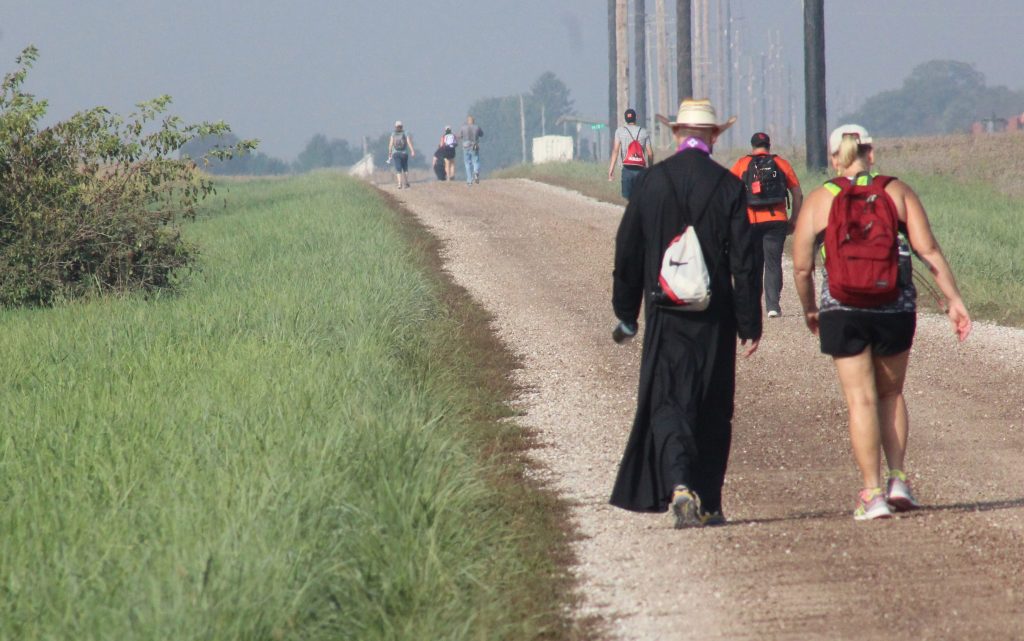Tracing Our Lives in the Shape of the Cross
Reflection on the readings for the 23rd Sunday in Ordinary Time, Year C.
Perfection
Imagine that God asks you to hold your arms out vertically for an entire day, sunrise to sunset. Then imagine that doing this will guarantee victory for one person in your life against their worst enemy: Victory against cancer, or depression, or temptation. Victory against unforgiveness, despair, or even death. Given this, would you hold your hands up all day? All week? Until the end of time?
We persevere for the ones we love. And we persevere when we are confident of victory. With these two weapons – love and confidence – we can arm ourselves for our vocations. And Jesus gives us both.
In the words of Venerable Fulton Sheen, when we stand before Christ at the end of our life, he will say to us,
“Show me your hands. Do they have scars from giving? Show me your feet. Are they wounded in service? Show me your heart. Have you left a place for divine love?”
We are each like Moses: Continually raising our hands in intercession for the ones we love, in need of others to come and hold us up. Perfection is communion with others through sacrifice, intercession, and dependence. To reach this perfection, we use the weapons of love and confidence.

Who Are You Raising Your Hands For?
This Sunday’s Gospel contains another ironic parable, like that of the dishonest steward. Like the steward, both the judge and the widow are motivated by self-serving interests. The widow doesn’t simply want justice. She wants revenge. And the judge only gives it to her because he’s afraid she’ll come and give him a black eye. If the widow perseveres in petitioning for a selfish reason, how much more so should Jesus’ disciples persevere in petitioning for just reasons? And if the judge soon caves in out of fear, how much more quickly will God give in out of love?
So what is your reason for petitioning? Who would you raise your arms for all day? What victory would you want them to win? And, if you would be willing to raise your arms for a whole day for one person, do you think Jesus would be willing to lift his arms up in intercession for you and me? Of course we know he did. He raised them on the cross and let them be nailed to it out of love.
Now Christ intercedes for us in heaven, raising his wounded hands up to the Father and gaining us the victory. Just as Moses’ hands “stayed steady till sunset,” Jesus will not lower his hands until we have had the chance to mow down our enemies and arrive safe in heaven. Jesus our perfection and salvation, and he offers perfect intercession for that end.
The more we look like Jesus – raising our tired, scarred hands for the salvation of others – the closer we get to the perfection of our vocation. The shape of our vocation is the shape of the cross. We’re like children who place a piece of paper over a shape and try to trace it. God measures our life by how consistently it adheres to the lines of the cross. And if he doesn’t answer our prayers for others immediately, it’s because he wants us to grow more into love, to stretch our arms a bit further so that we resemble Jesus crucified a bit more.
I’ve met lots of parents who “raise their hands” constantly for their children (sometimes in exasperation, sometimes in prayer). They suffer their children’s bad decisions, or insistently plead God for them to remain in (or return to) the faith. They would offer anything – time, talent, treasure, or even their own lives – for the children’s happiness. For their children’s salvation. These are the parents with scarred hands, with wounded feet, and room in their hearts for love. I’ve seen spouses who stick by their sick or dying lover and take on the same haggard features through exhaustion and empathy. This is what it means to be cruciform, to love in the shape of a cross.
As a priest, my role is to be conformed to Christ, to be an alter Christus (an “other Christ”). Of course the Eucharist is the main source of my imitation. But this love is made concrete and real through the crucifixions of other people that I encounter every day. Hospital patients and their families, penitents tortured by sin, confused and worried family members – these are all the people for whom I must raise my hands in petition. And by pressing my vocation against their sufferings, I can draw my life in the form of a cross.
Religious men and women who live the active life must constantly stretch their arms out to the people they serve. If they teach, they stretch their arms to include every student, from the difficult to the pleasant, from the ignorant to the gifted. If they serve the poor, they stretch their arms to reach those who are outside the bounds of natural human affection: drunks, mentally ill, belligerent and violent people. Their reach is always extending farther out.
And we know that there are heroic, hidden intercessors who lift their hands not only for the people they encounter every day, but for the whole world. They are the ones standing on the plane of their monastery or convent, hidden from our view, giving us unseen energy and courage in battle. We know that prayer can literally shift the winds in battle, so how many second-winds have the prayers of contemplative religious given each of us in our own personal fights?

Love, Confidence, and Communion
So if can we answer the question, “Who am I raising my hands for?” we know that we have love. We also need confidence. Confidence that Jesus Christ is interceding for us, and we can be victorious. Even if we don’t see our prayers for those we loved answered in this life, we know that the resurrection of Christ is the definitive answer to all prayers, and our own future resurrection is the ultimate victory. Jesus desires our salvation and perfection more than we do. He wants to see us victorious. One of our newest saints, canonized this Sunday, has this to say about God’s desire for our salvation:
God bends lovingly over this soul,
His adopted daughter, who is so
conformed to the image of His Son,
the ‘ first born among all creatures,’
and recognizes her as one of those
whom He has ‘predestined, called,
justified.’ And His fatherly heart
thrills as He thinks of consummating
His work, that is, of ‘glorifying’ her
by bringing her into His kingdom,
there to sing for ages unending ‘
the praise of His glory’.
Finally, besides love and confidence, we need communion. Even Jesus, God-Incarnate, leaned on Simon of Cyrene as he carried his cross. Who is holding your hands up? Who are your “Aaron and Hur”? One of my greatest joys in the Church is to see the complementarity of vocations: priests serve the laity, families build up and support priests, religious men and women work together with them all to build up the Church. There is no vocation that can be sustained on its own: we all came from families, we all need the sacraments, and we are all built up by holy consecrated people. Let’s make active decisions to support and affirm people in other vocations – especially those dedicated single Catholics, or those who are divorced or widowed, who often feel ignored or unsupported.
Pray with this Sunday’s readings. Ask Christ, “How can I make my life more cruciform? How can hold up the weary, wounded hands of people in other vocations? Whose arms can I lean my hands on when I grow tired?” Trace your vocation against the shape of the cross, and discover your confidence and your reason for living.

